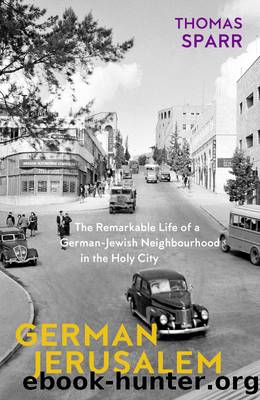German Jerusalem by Thomas Sparr

Author:Thomas Sparr
Language: eng
Format: epub
Publisher: Haus Publishing Ltd
Published: 2021-03-15T00:00:00+00:00
Guest Arabs: Brit Shalom
Escha Scholem wrote on 17 April 1932 to her husband Gerhard in Rome:
The club has met again since then, with some guest Arabs from outside Jerusalem in fact, who were thoroughly nice. But then something odd happened again. Karmi was sum-moned in front of the partyâs disciplinary tribunal, to give the details of what had supposedly been a private meeting. Whether heâs already attended and what came out of it, I havenât been able to find out.
The club in question is Brit Shalom (literally, âCovenant of Peaceâ) and that casual reference to âguest Arabsâ brings centre stage what was already by then a long-running conflict and the attempts to understand and defuse it. Founded in 1925 by Arthur Ruppin, Brit Shalom was an association of mostly German-Jewish immigrants, including Gershom Scholem, Ernst Simon, Shmuel Hugo Bergmann, Hans Kohn and Robert Weltsch from Prague, with the aim of establishing in Palestine a bi-national polity of Jews and Arabs. Brit Shalomâs enrolled membership numbered sixty, the majority in Jeru-salem, with around seventy-five friends, and it had support both inside and outside the country, from the likes of Martin Buber and Albert Einstein.
There had been tensions between the two peoples since the early 1920s, leading to bloody clashes in August 1929 in which 130 Jews and 116 Arabs were killed. Brit Shalom understood the attacks by the Arabs differently from the official Zionist organisations in Palestine: not as staged riots but as a nationalist uprising directed against Jewish settlement of the country. Its members clashed profoundly over whether the âCovenant of Peaceâ ought to become directly involved in politics or merely submit suggestions to the Zionist organisations in Palestine, in order to smooth over the clashes if not to remedy them. Years before Israelâs independence, the question was how such a state should be founded and constituted, as a confederation within a state on the Habsburg model, allowing peoples their national and cultural autonomy in a supranational frame. Michael Brenner has shown how most of the representatives of this influential group repudiated the traditional model of the nation state, preferring instead a concept â âhomelandâ â which left ample leeway for elaboration. Position papers were composed, petitions lodged, articles published, con-ventions held. Its members met up mostly in Rehavia, with the addition of some âguest Arabsâ from time to time. That casual phrase of Escha Scholemâs names Brit Shalomâs blind spot. The Jewish inhabitants kept largely to themselves. Brit Shalom finally dissolved itself in 1933; the disturbances of 1929 and strengthening nationalism on both sides hastened its dissolution.
No German-language writer has captured the atmosphere of Jerusalem in that fateful year of unrest more densely than Arnold Zweig in his novel De Vriendt Goes Home. Published in 1932, it remained on open sale for only one winter and even later, after the war, had as difficult a reception in the divided Germany as it did in Israel. Zweig, who would later emigrate to Palestine, had visited the territory earlier in 1932
Download
This site does not store any files on its server. We only index and link to content provided by other sites. Please contact the content providers to delete copyright contents if any and email us, we'll remove relevant links or contents immediately.
Blood and Oil by Bradley Hope(1558)
Wandering in Strange Lands by Morgan Jerkins(1417)
Ambition and Desire: The Dangerous Life of Josephine Bonaparte by Kate Williams(1383)
Daniel Holmes: A Memoir From Malta's Prison: From a cage, on a rock, in a puddle... by Daniel Holmes(1328)
Twelve Caesars by Mary Beard(1313)
It Was All a Lie by Stuart Stevens;(1294)
The First Conspiracy by Brad Meltzer & Josh Mensch(1167)
What Really Happened: The Death of Hitler by Robert J. Hutchinson(1154)
London in the Twentieth Century by Jerry White(1145)
The Japanese by Christopher Harding(1130)
Time of the Magicians by Wolfram Eilenberger(1125)
Twilight of the Gods by Ian W. Toll(1113)
A Woman by Sibilla Aleramo(1092)
Cleopatra by Alberto Angela(1092)
Lenin: A Biography by Robert Service(1073)
John (Penguin Monarchs) by Nicholas Vincent(1068)
The Devil You Know by Charles M. Blow(1024)
Reading for Life by Philip Davis(1023)
The Life of William Faulkner by Carl Rollyson(980)
